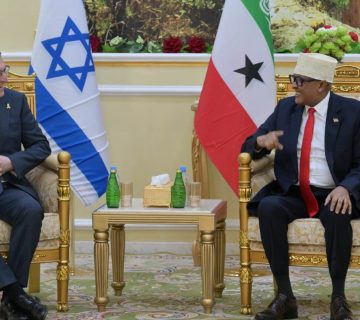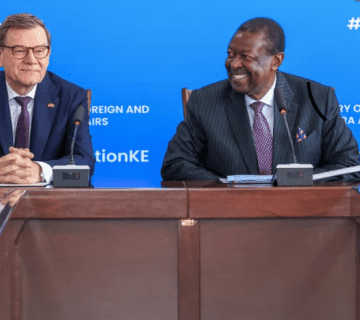As the election of the Mousa Faki’s successor at the African Union (AU) Commission draws nigh, the Raila Odinga’s potential role as African Union Commission Chairman presents a significant opportunity for enhancing continental trading across Africa. Raila Odinga is Kenya’s candidate for the rotational seat at AU; he is one of Kenya’s most consequential politicians, cabinet ministers, prime ministers and Pan-African leaders of the day. Odinga brings forth extensive political experience and commitment to fostering economic integration which position him as a pivotal figure in facilitating trade on the continent.
As one of the last living Pan-Africanist stalwarts, Odinga’s vision for Africa united by not just by race, culture and shared history and geography, but also by the larger dream to achieve the highest standards of living and economic prosperity, aligns with the objectives of the AU Agenda 2063 and its flagship project, the African Continental Free Trade Area (AfCFTA), which aims to create a single market for goods and services. Through AfCFTA, Africa’s trade in terms of volume and market share, intraregional trade is projected to grow by 29 per cent and extra-regional trade by 19 per cent at least by 2035. In terms of sector performance (in trade) manufacturing is estimated to grow by 62 percent, driving export growth in intra-Africa manufactured up by 110 percent and extra-Africa by 46 percent. Intra-Africa agricultural trade would increase by 49 per cent and extra-Africa trade by 10 per cent, and services by 14 per cent and four per cent respectively.
Odinga’s widely known advocacy for economic regional integration positions him as a key proponent of the African Continental Free Trade Area (AfCFTA) and a formidable champion for the success of AfCFTA as the new AU Commission Chairperson. His election would be critical in terms of its timing, given AfCFTA is still in its nascent stage but is already lagging behind in its timeframes and milestones aimed at totally eliminating trade barriers and integrating markets and economies across the continent. The merger of more than 40 African economies through AfCFTA will create USD 3.4 trillion economy and position Africa as one of the world’s largest economies and free trade areas.
In his vision statement, Odinga has passionately lent himself to the issue of economic prosperity and integration, to the extent that it is the single-most defining feature of his candidature. He is also being endorsed by a president who is considered across Africa as a “neo-Pan-Africanist” given his strong appeal for regional integration and robust projection of the African voice on the international stage, specifically the international financial and trading systems. Kenya’s President William Ruto is a pioneer for African payment systems for intra-regional trade and for “no-visa” policies towards fellow Africans; these progressive ideas have been widely accepted and are eagerly awaited in Africa. Such novel innovations for regional integration will be significant enablers of intra-regional commercial output and this is what Odinga, while tasking unto himself to lead Africa’s economic renaissance, has thus branded himself as the “African Lion”, in his quest for the key AU Commission role.
Odinga bears solid experience of successfully mobilising support among African countries’ commitments to connectivity infrastructure in his previous role as the AU Special Envoy for Infrastructure. Moreover, Odinga’s emphasis on infrastructure development will be vital in improving connectivity between nations, thus promoting trade logistics. He can leverage partnerships with international organizations to secure funding for infrastructure projects, facilitating movement of goods and services across borders.
Odinga rightly hopes to mobilise political will across the continent to fully implement AfCFTA. He will further build on established ties, networks and negotiating legacy in mobilising financing solutions for mega infrastructure in Africa, to facilitate negotiations that enhance cooperation among African states and provide a unified front in discussions with larger economies and markets such as the United States of America, European Union (EU), India, Turkey and China as well as other regional blocs and investors from the Americas, Europe, Middle Eastern and Asia.
Raila Odinga’s potential appointment as the African Union Commission Chairman presents a significant opportunity for the advancement of commerce and infrastructure development across the continent. Under Odinga’s leadership, the African Union can adopt innovative policies aimed at infrastructural development. His track record in advocating for public-private partnerships suggests a promising avenue to attract investment for critical projects, ranging from roads and railways to energy and digital infrastructure.
Such initiatives will not only bolster regional commerce but will also create jobs and encourage both local and foreign investments. Raila Odinga’s commitment to democratic governance and stability is crucial for fostering an environment conducive to economic collaboration. By promoting peace and security, he can help ensure that commerce operates smoothly across borders, thereby enhancing trade volumes among African nations.
Finally, by promoting technology transfer and capacity building, Odinga can help fill the economic gaps within Africa, making it a more viable partner for American, European, Middle Eastern and Asian investors. The African Union, under his leadership, could initiate strategic partnerships in technology, agriculture, and infrastructure, fostering an environment where trade flourishes.In conclusion, Raila Odinga’s tenure as African Union Commission Chairman has the potential to significantly enhance trade relations with American, European, Middle Eastern and Asian investors, leveraging his diplomatic prowess to create a robust framework for mutual economic growth.
In conclusion, Raila Odinga’s leadership as African Union Commission Chairman can significantly enhance continental trading by fostering economic integration, improving infrastructure, and empowering local entrepreneurs. His vision for a prosperous Africa could lead to increased collaboration and trade, ultimately driving sustainable economic growth across the continent.
Photo Credits: Kenya’s Foreign Affairs X(Twitter) Page.



